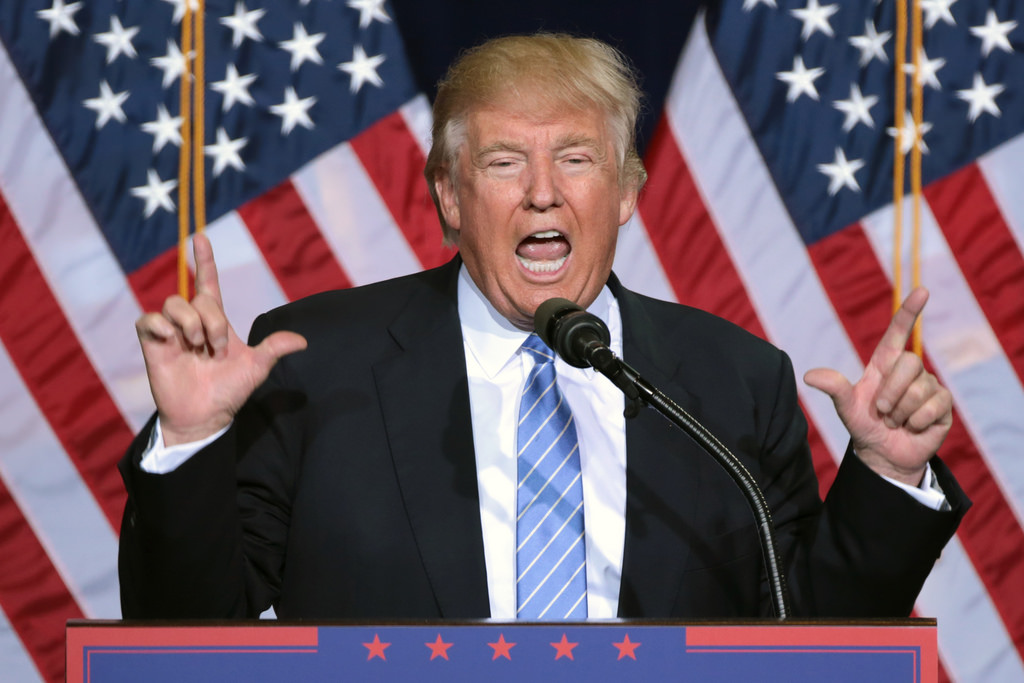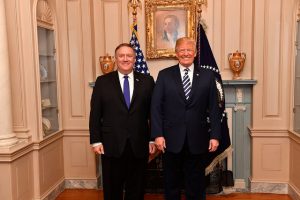By Paul R. Pillar
Confusion has prevailed regarding the purposes of the U.S. troop presence in Syria, and whether the declared purposes are the actual ones. Originally the expedition was widely understood to be all about combating the Islamic State (ISIS) after the group had established a mini-state on a large portion of Syrian and Iraqi territory. Then hawks within the Trump administration and President Trump himself, in a classic case of mission creep, declared that the U.S. troops were also in Syria to “watch Iran.” Later variations of the creeped-up mission included not only watching Iran but also, through some unexplained mechanism, getting Iran and maybe Russia to abandon their positions in Syria.
More recently, Trump has been under much pressure from various parts of the political spectrum to keep the U.S. military in Syria, in contradiction with his earlier stated intention to exit and his orders to redeploy troops that had been in the Kurdish-inhabited northeastern part of the country. Political pressures and contradictory tendencies are a prescription for even less clarity than before about what the troops’ mission is or ought to be. Trump, who is trying to milk as much political advantage as possible from the killing of ISIS leader Abu Bakr al-Baghdadi and proclaimed that because of al-Baghdadi’s death “the world is now a much safer place,” is resisting the idea that the original mission of combating ISIS in Syria is still necessary, at least in the general and open-ended way in which that mission was first framed. So now the declared mission has evolved yet again, with a new rationale that had emerged even before al-Baghdadi’s removal. Some U.S. troops are staying in eastern Syria, according to this rationale, to secure Syria’s modest oil resources.
There is still an ISIS dimension to this rationale, in that the group, while it had its mini-state, gained some revenue from exploitation of oil fields under its control. But to do that it needed the mini-state. Any scenario in which ISIS once again exploits, rather than just damages, Syrian oil fields presupposes re-establishment of its territorial caliphate, which means the world would once again be facing a bigger and more general anti-ISIS task. In its current status as an insurgent movement and terrorist group rather than a mini-state, ISIS is in no position to exploit the oil, except perhaps in an extremely small way, in the manner of Nigerian banditry, by surreptitiously tapping into a pipeline.
This leaves open the question of what the Trump administration intends to do with the oil that it has “secured” through military occupation. That in turn raises disturbing questions of whether the United States is engaging, contrary to international law, in wartime pillaging of Syria’s oil.
But there is another disturbing implication that deserves attention especially because of how big a deal Trump is attempting to make of the blows against ISIS and how they supposedly have made the world “much safer.” From a counterterrorist perspective, taking possession of oil resources is one of the worst possible rationales for justifying a U.S. military presence in a foreign country. And in his Sunday morning performance, Trump couched the subject in one of the worst possible ways.
A prominent and longstanding theme in the ideology and propaganda of terrorist groups rooted in the Arab Muslim world—including al-Qaeda and ISIS—is that the United States and the West are out to plunder the resources of Muslims. Such groups violently oppose U.S. troops in Muslim countries partly because they are seen as furthering the plundering mission. Osama bin Laden repeatedly returned to this theme. In a 2004 audio recording, for example, bin Laden stated that “the biggest reason for our enemies’ control over our lands is to steal our oil.” Bin Laden’s successor, Ayman al-Zawahiri, in a 2005 video called on his followers to “focus their attacks on the stolen oil of the Muslims…This is the greatest theft in the history of humanity. The enemies of Islam are consuming this vital resource with unparalleled greed.” The terrorists’ focus on oil has raised concerns about terrorist attacks on oil facilities, but the idea of stealing resources that rightfully belong to Muslims has motivated attacks on the United States wherever such attacks can be staged.
Trump’s Sunday appearance before the press played right into this theme. Referring back to the Iraq War, Trump described as his own view at the time that if the United States was going into Iraq, it should “keep the oil.” As for Syria’s oil, he said it can help the Kurds but “it can help us because we should be able to take some also. And what I intend to do, perhaps, is make a deal with an Exxon Mobil or one of our great companies to go in there and do it properly.” A propagandist for ISIS or al-Qaeda would hardly have written the script differently.
Even if there were any ISIS fighters who turn away from their cause in response to Trump’s probably embellished account of a “screaming, crying, whimpering” al-Baghdadi, there surely are many more who are energized by the evidence confirming what their leaders have always told them about U.S. plundering of Muslim resources. Trump’s priority, however, was not in speaking to them but instead, as always, to his domestic political base.






Mr Herera,
I do not know where you got the impression that I am a professional writer – far from it. I encourage you to read a little about me after a brief Google search. This is part of what you might find – I was an oil executive for 21 years at Mobil Oil and ExxonMobil and joined a Pentagon oil planning team in 2002 after retiring from ExxonMobil. I did this at the urging of many of my West Point classmates and friends who would serve in general officer ranks in Iraq. I was the Oil Minister during my first ten days in Baghdad in April 2003 while working for Jay Garner and until I appointed Mr. Thamir Ghadhban to the position on May 3, 2003. Ghadhban is currently the Iraqi Deputy Prime Minister and Oil Minister. In 2011, I departed Iraq after serving 75 months in-country – more than any other American under the DOD. My retired general officer friends encouraged me to write the Iraq oil story after I joined Ambassador LP Bremer on the Rachel Maddow Show in March 2014 to deny that oil played any role in the decision to invade Iraq. That is when I agreed that a book needed to be written and I was the best qualified to do it with the help of some friends who wrote many books. My research for the book in the international press enlightened me to the lies, treachery and greed of the neocons who were part of the Bush Administration. Our military experienced 4,489 KIAs and 33,000 WIAs largely because of the neocon lies.
I consider myself to be an Iraq oil expert and many oil reporters who cover the Iraqi oil sector frequently contact me because they also consider me an expert. My book was called a gold mine of information about the Iraq oil sector by Petroleum Economist.
I also never claimed to be an expert on Syria and so I confined my remarks to a strategy for US soldiers guarding oil infrastructure – something that I became very familiar with in the summer of 2003 while in Iraq. Having US soldiers guard any oil infrastructure in Iraq or Syria makes no sense to me – how is that in our national interests? How do you explain to the parent of the 19-year-old soldier who dies defending those Syrian oilfields that they died supporting the national interests of the US? We hired 14,500 Iraqis in 2003 to defend their own oil and the Iraqi oil revenue was used to pay them.
I also learned a little about Senator Lindsay Graham during my many years in Iraq. So, when he gets excited about something in the Middle East I become suspicious. He is a neocon.
Gary Vogler
You need to get the Protestant Churches in US (excluding the African-American churches) to appreciate the enormous harm they have done to the United States and indeed Christianity by pursuing their religious fantasies in Palestine.
Protestant Churches of the United States had positively contributed to health and education fields in the Near East but all of that was given up on the altar of Zionist Judaism.
I submit to you that US policies in Palestine, in Iraq and in Syria, profoundly have harmed Christian communities, do Protesant Churches care one whit about that?
US is in a long war against Islam on behalf of Israel, the Protestant Churches must be disabused of the notion that US can prevail. Unitil they are, the situation will not improve, in my opinion.
GARYVOGLER,
Since you have been employed in the oil business and operations, please go further back in time and research the history of crude oil perhaps since 1953 or even earlier. The atrocities that the infamous 7-sister oil companies have committed in the ME and later in NA for controlling and stealing the resources have been and still are very clear and obvious to the powerless people in these regions for the past 100 years. Of course this is no reflection on you since the decision makers were the criminal people like Rockefeller family, the Tri-Lateral commission which included Zbigniew Brzezinski and finally the transformation of TL-commission into the ZNeoCons initiated by ZB. Perhaps Graham has just joined them recently because he is a man with “thousand faces” portrayed by Jimmy Cagney!
“Keep the oil.”
President Trump is often called out for the stream of lies that flow effortlessly from his mouth.
But when he speaks the truth he gets criticized the most. Here he contradicts the pious pronouncements of prior presidents who proclaimed that the US has no territorial ambitions.
No we don’t want your sand, but we do want what is underneath.
David Bernard
Americans are still trying to build an equivalent of Iraq’s KRG in Syria for the ultimate benfit of Israel – funded by Syrian oil.
They face 3 problems:
Syrian Arabs, regardless of their pitical position on Assad and SAR, would consider that a theft of their birthright and will never accept this.
Kurdish populations of Turkey and Syria belong to the same tribes, they are divided by the Sykes-Picot border. Turkey will consider a new KRG within 30 kilometers of her borders as a threat to its territorial i tegrity and will work with Russia, Iran, Iraq, and SAR to destroy it.
And then there is the problem of US ligistics, this Fort Apache has to be supplied by air and defended by whom? A bridge too far.
That Americans are still trying, at this late hour, to advance the cause of Israel, and in contravention of the state interests of their Turkish NATO member, is not something to be oppised. They are dighing themselves deeper. Let them.